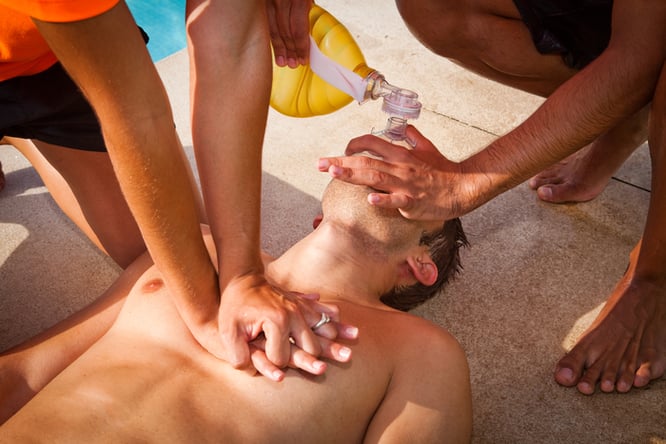
Example of edit made in “suggestion mode”. Summer is upon us, and it seems like only yesterday we were dealing with the winter woes of emergency medicine: traumatic injuries from winter sports, an onslaught of influenza as the temperatures plummeted, and the winter doldrums that can lead to depression and anxiety for those predisposed.
But now summer is here, and the next few months should be free of illness and injury, right? Wrong! With the arrival of summer, there is a whole new suite of issues, many involving the respiratory tract and many requiring suction.
So, as a precursor to the warm months ahead, let's review three common summertime respiratory emergencies requiring suction so that we might head them off at the pass.
1. Anaphylaxis
The warmer months mean insects are on the rise. And with them come the opportunity for bites and stings. For most of us, this is a simple, yet painful, inconvenience. But for those who have allergies to bees, wasps, hornets, or ants, it can spell death.
Anaphylaxis is a severe, life-threatening allergic reaction that, if not treated, can lead to shock. Common symptoms include:
- Hives, flushed skin, or pale skin
- Difficulty swallowing
- Nausea, vomiting, or diarrhea
- Abdominal pain
- Weak and rapid pulse
- Runny nose and sneezing
- Swollen tongue or lips
- Wheezing or difficulty breathing
Your patient may be unable to protect his or her airway, especially if he or she loses consciousness, so keep the portable suction unit close by, in case you need it.
2. Temperature Extremes and Geriatrics
We tend to think of winter as putting the elderly at risk, but summer poses dangers to these patients as well. As we age, our ability to regulate body temperature deteriorates, leaving us prone to hot and cold emergencies. For those geriatrics who live alone and are unable to recognize the warning signs, they may become hyperthermic and dehydrated, leading to loss of consciousness. And as we know, anyone who loses consciousness can no longer protect his or her airway; thus, he or she may require suction.
Thermoregulatory problems are compounded by diabetes, heart disease, and obesity. Prescription meds, such as diuretics and beta blockers can add to heat issues, so be extra cautious in those on prescription medications.
The warmer months can also exacerbate pre-existing respiratory conditions, such as COPD. Sudden exposure to warm air can cause bronchospasm in these patients, leading to difficulty breathing. Summertime pollen and molds can lead to further problems, so when responding to elderly patients, be sure to bring along the portable suction unit.
3. Drowning
As the warm weather sets in, people flock to water. Beaches, lakes, and rivers become social hubs as folks take to swimming and other recreational activities. It's not surprising that drowning rates spike in the summer.
According to the CDC, between 1999 and 2010, there were more than 3,500 fatal unintentional drownings, with an additional 300-plus caused by boating accidents. About one in five deaths by drowning are in children younger than 14 years of age.
Emergency responses to drownings can be chaotic affairs, especially when they involve children. The scenes are typically outdoors and can at times be challenging to reach, especially if they take place at lakes or rivers. Therefore, it is imperative you bring ALL your ALS equipment with you on scene, and this includes your portable suction unit.
In drownings, just as in any cardiac arrest, every second counts. There is not enough time to run back to the truck to retrieve equipment, especially if the call takes place off-road. If your territory includes such locations, you may want to consider a smaller, lightweight portable suction unit that can be packed into the first-in or oxygen bag for easy transport. When dealing with pediatric patients, it will behoove you to have a suction unit with adjustable pressure so that you can dial it back when suctioning smaller patients. Whatever style unit you choose, make sure to always have it with you when responding to water emergencies.
Summer should be a time of carefree fun. But as an emergency responder, you know that each season presents certain challenges. So, be prepared for the warmer months and the respiratory emergencies that may occur. Be sure to keep your suction unit at the ready, to ensure your patients' airways remain protected.
2011, Pollak, A., Ed.
Critical Care Transport, American College of Emergency Physicians, Jones and Bartlett.















